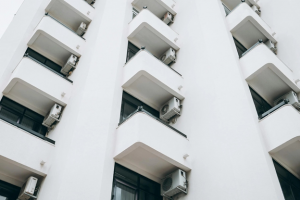Welcome to this comprehensive guide on maximizing the effectiveness of your home’s air conditioning system. In a world where indoor comfort is paramount, maintaining your A/C unit in peak condition is essential. No one can overemphasize the importance of regular maintenance, including the necessity of using a professional HVAC company to diagnose and resolve any issues.
This article delves into the critical aspects of A/C efficiency, addressing common challenges and providing actionable tips to ensure your system operates effectively. Additionally, it covers strategies for optimizing airflow, enhancing indoor air quality, and utilizing programmable thermostats for efficient temperature control.
By the end, you’ll understand how to keep your A/C system running smoothly, ensuring maximum comfort and energy savings for you and your family. Dive in!
Install a Programmable Thermostat
Installing a programmable thermostat can significantly enhance your home’s A/C efficiency. By allowing you to set specific temperature schedules, you can optimize energy usage based on your daily routines.
It means you won’t waste energy cooling an empty house while at work or asleep. Plus, many programmable thermostats offer remote access via smartphone apps, enabling you to adjust settings from anywhere.
This level of control increases convenience and saves you money on energy bills in the long run. When considering installation, ensure compatibility with your A/C system and seek guidance from a professional HVAC company for proper setup. With a programmable thermostat, you’ll experience customized comfort while maximizing energy efficiency effortlessly.
Change Your Filters
Regularly changing your home’s air filters is a simple yet crucial task in maintaining effective A/C operation. These filters trap dust, dirt, and other particles, preventing them from circulating through your home and clogging the A/C system. Over time, dirty filters restrict airflow, forcing the A/C unit to work harder and consume more energy.
You ensure optimal airflow and maintain indoor air quality by changing filters every three to six months, depending on usage and filter type. Doing so prolongs the lifespan of your A/C system and improves its efficiency, reducing energy costs in the process.
Remember, it’s best to use filters recommended by your A/C manufacturer for optimal performance. If unsure, consult a professional for guidance on filter selection and replacement frequency tailored to your specific system and needs.
Fix Leaks
Addressing leaks in your home’s A/C system is essential for maintaining its effectiveness and efficiency. Leaks compromise the cooling performance and lead to energy wastage and potential damage to your property. Common areas for leaks include ductwork, refrigerant lines, and around window units.
Identifying and fixing these leaks promptly can prevent further issues and ensure your A/C system operates optimally. While some leaks may be visible, others may require professional inspection. Hiring a professional HVAC company to conduct a thorough evaluation is recommended, as they have the expertise and equipment to pinpoint and repair leaks efficiently.
Additionally, sealing ductwork and insulating refrigerant lines can help prevent future leaks, improving overall system performance and reducing energy consumption. You will enhance your home’s comfort and save on energy costs in the long run by addressing leaks promptly.
Select the Right A/C Size
Choosing the right A/C size is crucial for optimal performance and energy efficiency. A unit that’s too small will struggle to cool your home effectively, leading to discomfort and increased energy consumption as it constantly runs to keep up with demand.
On the other hand, an oversized unit may cool your home too quickly, resulting in frequent on-off cycles that waste energy and fail to adequately dehumidify the air, leading to a clammy indoor environment. It’s essential to consider the square footage, ceiling height, insulation, and climate to ensure you have the right-size A/C unit for your home.
Consulting with a professional to perform a load calculation is highly recommended. This calculation considers various factors specific to your home to determine the appropriate size and capacity of the A/C unit you need to cool your space efficiently.
Investing in the right-size A/C unit upfront can lead to long-term energy savings, improved comfort, and extended equipment lifespan.
Close Windows and Doors
Leaving doors and windows open while running your A/C system can significantly impact its effectiveness and energy efficiency. When doors and windows are open, cool air escapes and warm air enters, causing your A/C unit to work harder to maintain the desired temperature. This increases energy consumption and reduces the system’s ability to cool your home effectively.
It’s essential to keep doors and windows closed while the system is running to maximize A/C efficiency. This helps contain the cooled air within your home, allowing the A/C unit to operate more efficiently and maintain a consistent temperature. Additionally, sealing drafts around doors and windows can improve energy efficiency by preventing cool air from escaping and warm air from entering.
Consider using ceiling fans or opening windows strategically during cooler times of the day (such as early morning or evening) if you need to ventilate your home. This allows you to take advantage of natural ventilation without compromising A/C performance. You can optimize your A/C system’s effectiveness and reduce energy costs by being mindful of airflow and minimizing unnecessary heat gain.
Set the Right Temperature
Setting the right temperature on your thermostat is crucial for A/C efficiency. Aim for a comfortable yet energy-saving temperature, typically around 78°F (25.5°C) when at home and slightly higher when away. Steer clear of extreme temperature fluctuations since they put stress on the system. Utilize programmable thermostats to adjust settings automatically, optimizing comfort and energy usage throughout the day.
Maintaining Your Home’s A/C System
Maintaining your home’s A/C system for optimal efficiency requires attention to various factors. Every aspect plays a crucial role, from regular filter changes to addressing leaks and choosing the right-sized unit.
By following these tips and utilizing professional HVAC services as needed, you can ensure your A/C system operates effectively, keeping you cool and comfortable while minimizing energy costs. With proactive maintenance and smart usage habits, you’ll enjoy reliable cooling and enhanced indoor comfort for years to come.



